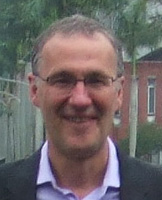5 juin 2014: Prof. Alain Filloux
Thursday, June 5th 2014 - 12h30
Prof. Alain FILLOUX
Director of MRC Centre for Molecular Bacteriology and Infection
Department of Life Sciences, Imperial College London UK

«The Pseudomonas Aeruginosa type VI Secretion System:
a Weapon for Bacterial Warfare»
Gram-negative bacteria have evolved robust nanomachines to transport proteins to extracellular compartments. The secreted proteins are usually released in the environment but some of these systems are specialized in bacteria-host interaction. As such they can for example inject effectors into eukaryotic cells thus subverting the host signaling process to their advantage. The type VI secretion system (T6SS) brought several new concepts in the field. Most notably the structure of the machine is highly reminiscent of bacteriophage tails, which are specialized DNA injection devices. The similarities with the T6SS are promising and it is wise to follow the bacteriophage trail to perform structure-function analysis and elucidate mechanistic aspects. Some of the T6SS-related molecular mechanisms will be described and differences between systems highlighted. For example, studying the ClpV ATPase unveils how subtle changes contribute to the evolution and improvement of the mechanism. Another important concept is the observation that while the T6SS is a potential device in the interaction with eukaryotic cells, it has also specialized in targeting other bacteria and can be seen as a very powerful weapon for bacterial warfare and competition. There are multi examples of bacterial toxins, which are transported in a T6SS-dependent manner, and Pseudomonas aeruginosa can use a remarkable collection of ammunitions, which make it a resilient and potent competitor when facing other organisms.
Biography
Alain Filloux received his PhD degree in 1988 from the « Université d’Aix-Marseille » (France). From 1988 to 1993, he stayed at the University of Utrecht, (The Netherlands), initially as a post-doctoral fellow and later appointed as assistant Professor. In 1994, he is recruited at the French National Centre of Scientific Research (CNRS) in Marseille (France), where he is appointed as head of a research unit in 2003. In 2008, he was appointed as Professor in Molecular Microbiology at the Imperial College London (UK) and he is the deputy director of the MRC Centre of Molecular Bacteriology and Infection. In 2013 he is appointed editor in chief for FEMS Microbiology Reviews. The main focus of his research is on bacterial pathogenesis, molecular mechanisms of protein secretion, biofilm formation and regulation of gene expression. The system model he used is the bacterial pathogen Pseudomonas aeruginosa.
